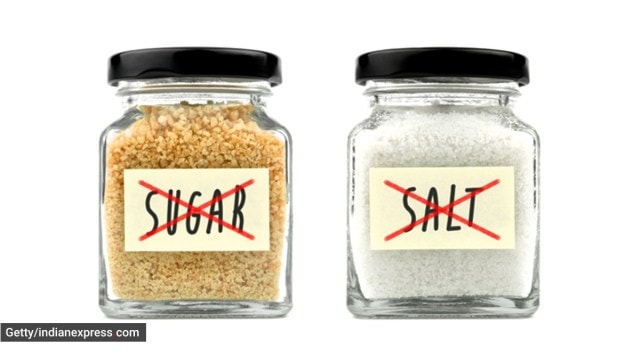📣 For more lifestyle news, click here to join our WhatsApp Channel and also follow us on Instagram
WHO shares nutrition tips ‘to reduce your risk of non-communicable diseases like diabetes, cancer’
The World Health Organization (WHO) recently came out with a food advisory and explained in a series of tweets the steps to take to ensure health
 According to the WHO, one must eat a variety of healthy foods every day and cut back on salt and sugar from their diet. (Photo: Getty/Thinkstock)
According to the WHO, one must eat a variety of healthy foods every day and cut back on salt and sugar from their diet. (Photo: Getty/Thinkstock)Around the world, there is currently a lot of push for healthy eating and consumption of foods that boost the immunity. Many people are now beginning to understand the concept of a clean diet, and as such, making some culinary tweaks.
Buy Now | Our best subscription plan now has a special price
But, there is also a bit of confusion as to what exactly must one eat and avoid. With many experts and editorial pieces suggesting different things, it is best to trust credible sources when it comes to health.
The World Health Organization (WHO) recently came out with a food advisory and explained in a series of tweets the steps to take to ensure health. From cutting back on salt and sugar, to being mindful of what you drink, find out what the international public health body had to say.
Nutrition tip 1: Cutting back on salt and limiting sugar intake
Cutting back on salt and sugar are simple ways to reduce your risk of noncommunicable diseases like #diabetes, heart disease and #cancer.
Here are a few easy-to-follow nutrition tips to get you and your family started on a healthier journey. #BeatNCDs pic.twitter.com/sllT4fMxFX
— World Health Organization (WHO) Western Pacific (@WHOWPRO) August 12, 2022
According to the WHO, cutting back on salt and sugar are simple ways to reduce your risk of non-communicable diseases like diabetes, heart disease and cancer. It explained in a tweet that one must limit their salt intake to 5 grams or 1 teaspoon per day, and instead experiment with fresh or dried herbs and spices.
But, this is not enough as the WHO also warned against using salty sauces and condiments like soy and fish sauce.
When it comes to sugar, consume no more than 50 grams or 12 teaspoons of sugar per day. Also keep in mind to not add salt and sugar to complementary foods given to children under 2 years of age.
Nutrition tip 2: Watch your fat intake
One way to reduce your risk of developing noncommunicable diseases such as #hypertension, stroke and heart disease is to watch your intake of saturated fats & trans-fats.
Here are some easy-to-follow nutrition tips that can set you on your way to a healthier life. #BeatNCDs pic.twitter.com/FrjZSRUy0v
— World Health Organization (WHO) Western Pacific (@WHOWPRO) August 14, 2022
The WHO said one way to reduce the risk of developing non-communicable diseases such as hypertension, stroke and heart disease is to watch your intake of saturated fats and trans-fats. This can be done by selecting low-fat or reduced-fat milk and dairy products.
The health advisory suggested choosing white meats “like poultry and fish” and limiting the consumption of processed meats like bacon and sausages. It also warned against the consumption of processed, baked and fried foods.
Nutrition tip 3: Think about a balanced diet
One way to reduce your risk of developing noncommunicable diseases such as diabetes, #cancer and heart disease is to think about balance in the way you eat.
Here are some easy-to-follow nutrition tips to better guide your daily food choices. #BeatNCDs pic.twitter.com/ca3LWyi6iW
— World Health Organization (WHO) Western Pacific (@WHOWPRO) August 15, 2022
The WHO suggested that you eat a variety of food every day, which includes wholegrains like brown rice and wheat, legumes like lentils and beans, plenty of fresh fruits and vegetables, and some foods from animal sources like meat, fish, eggs and milk.
When it comes to snacks, choose raw vegetables, fresh fruits and unsalted nuts.
Nutrition tip 4: Being mindful of what you drink
One way to reduce your risk of developing noncommunicable diseases such as #cancer, liver disease, stroke and #hypertension is to be mindful of what you drink.
Here are some easy-to-follow nutrition tips on how to improve your health simply through the choice of your beverages. pic.twitter.com/w2lGjXLhjB
— World Health Organization (WHO) Western Pacific (@WHOWPRO) August 20, 2022
It is also important to know what you drink. The WHO explained in a tweet that one must reduce the consumption of sugary beverages like soft drinks, juice, flavoured water, and ready-to-drink coffee. It is also prudent to cut back on alcohol consumption and instead drink more water.
📣 For more lifestyle news, follow us on Instagram | Twitter | Facebook and don’t miss out on the latest updates!
📣 For more lifestyle news, click here to join our WhatsApp Channel and also follow us on Instagram





- 01
- 02
- 03
- 04
- 05






















